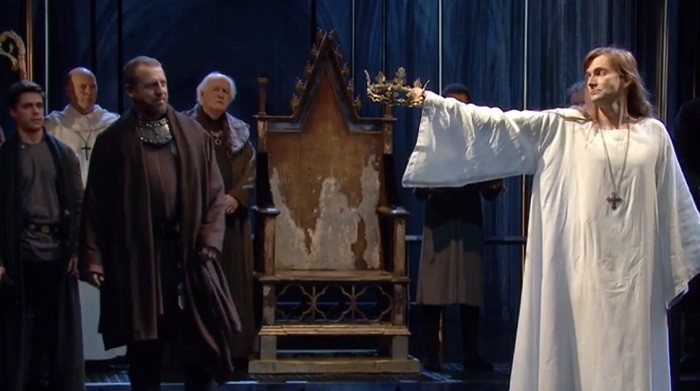Digital Theatre review: David Tennant’s Richard II
Review Overview
Tennant
10Cast
10Production
10David Farnor | On 23, Apr 2016
“You may my glories and my state depose, but not my griefs. Still, am I king of those.”
David Tennant’s Richard II is a masterful study of doomed royalty. Tennant, who was superb as the troubled Hamlet several years before he returned to the stage with director Gregory Doran for this production, is perhaps even better as the flawed ruler – his boyish enthusiasm and earnest sentiment, qualities that swiftly won the hearts of Doctor Who fans, are perfectly suited to the role of the childish Richard.
When we meet him, he’s almost aloof, showing no respect to those around him – a shining, white-robed figure surrounded by black-clad mourners. He listens to a dispute between Thomas Mowbray and Richard’s cousin, Henry Bolingbroke, with no appparent care, an arrogant young boy who would be king, rather than a king in his own conduct. The fact that all this takes place at the funeral for the Duke of Gloucester, whom Richard may or may not have had killed, only emphasises his naive judgement.
Tennant jumps upon these qualities with a keen tongue, teasing out the indecision, the capricious, self-centred sulkiness and cruel, misjudged rulings. But the actor simultaneously manages something more spectacular – he makes us feel sorry for him. Him, the long-haired man swanning about like Jesus with all the Medieval assumption of God-given authority a man could muster. It’s partly Tennant’s youthful face that does it, the very thing that undermines the king later becoming the thing that demands our sympathy – the actor skillfully reveal Richard’s vulnerability, just as his status in the world crumbles.
It’s to the play’s credit, though, that it’s never just about him: Tennant is matched on all sides by a stellar ensemble, all of whom make Richard’s fall far more tragic – and, just as importantly, deserved. Nigel Lindsay’s Bolingbroke has the passion and grit of a man who deserves to be in charge, while Oliver Ford Davies (who stole the show as a dithering Polonius in Tennant’s Hamlet) once again skillfully brings both comedy and pathos to the table as the conflicted Duke of York. Michael Pennington, meanwhile, leaves a powerful impression as John of Gaunt, who spits the “This sceptr’d isle” speech with venom – only for Richard to blithely seize all of his assets.
Even the scenery is flawlessly executed, as Stephen Brimson Lewis’ production design presents us with a throne that is elevated on a gantry above the rest of the stage – Richard’s throne is first glimpsed descending from the heavens, echoing the king’s own self-delusion. But, crucially, it’s a moving platform, a temporary position of loftiness that, as the play progresses, sinks closer and closer to the floor. Tim Mitchell’s lighting and Paul Englishby’s music only add to hallowed mood, as it’s both subverted by Richard (in his disrespect during the opening memorial) and then destroyed altogether. By the end, he’s lit from above, gazing up at an unseen dungeon roof – the lowest of the low.
But Tennant, throughout, remains as immature as he is melancholic; when the question of giving the crown to someone else arises, he treats it like a game of fetch with a dog, before lapsing into cries of his own grief – grief that he clings to, as it’s the only thing vaguely king-like he has left. When we see Aumerle appear at the end to play a decisive role in Richard’s downfall, following an intimate kiss (gantry half-raised), the wound becomes doubly painful.
History is something that can be dry and, to some ears, dull. Convey it in iambic pentameter and the effect can be seen as doubly so. But the RSC and Tennant deliver a rousing reminder that this isn’t the case – this Richard II is politics at its most personal, a moving study of a king only learning the value of what that word means once it’s gone.
David Tennant’s Richard II is available to stream online in the UK on Marquee.TV, as part of an £8.99 monthly subscription – with a 14-day free trial. It is also available on DigitalTheatre.com to rent for £7.99 or as part of an £9.99 monthly subscription.




















